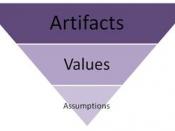MANAGING ACROSS CULTURES
National and Corporate Cultures
Culture, is something very much personal to an individual. And avoiding it, knowingly or unknowingly, can at times be interpreted as disgraceful an act as abusing somebody's identity, his / her origin; or at times could completely be ignored. It all depends on a person's attitude, perspective, values, ethics - that collectively form culture.
Conflict between the company's culture and the country's culture introduces a discussion of National Vs Corporate culture. A company's culture may be informal while a country's culture could rather be formal. A company may show a highly dynamic environment, willingness to take risk, and yields a feel of enthusiasm and charisma - whereas a country chooses to be rather more consistent - or vice versa. A country over the years incorporate some values, attitudes, and ethics in its children. This is what is referred to as National culture.
Organisational culture is a package of policies, rules, regulations, and code of conduct to be followed in a particular company. These two often collide. Many of the organizations today, have a culture that is more or less not in-line with the culture of their parent country. This is often the case with multinational companies, which prefer to run by their root country's norms, even with their subsidiaries abroad. More, tourism and hospitality industry is an industry globally developed and hence often the conflicts of cultures are noted in this business.
However, It is in a company's best interest to carefully assess its organizational culture against the local cultures in all countries and regions it is engaged in, and probably adopt to a certain extent.
Complexities and Challenges faced by the International Manager in a Global Environment
"If a student was a captain of the club, then he is likely to...


